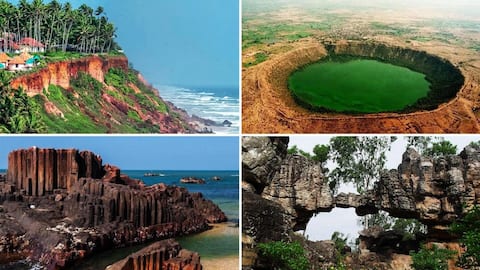Exploring popular geo-heritage monuments in India
What's the story
India is home to 34 officially recognized National Geological Heritage Monument Sites, each a testament to the nation's rich geological history. Showcasing the diverse geological heritage of the subcontinent, these sites provide invaluable insights into the Earth's past while offering immense scientific, educational, and cultural value. Let's explore five of these natural wonders that draw geologists, researchers, and tourists from around the globe.
Karnataka
Columnar Basalt Formations, St. Mary's Islands
St. Mary's Islands, off the coast of Karnataka, are renowned for their distinctive columnar basalt formations. These hexagonal columns were formed about 88 million years ago during the break-up of the supercontinent Gondwana. The lava cooled and solidified in a hexagonal pattern, creating a striking natural monument. These formations are significant for understanding the volcanic processes and the geological history of the Indian subcontinent.
Himachal Pradesh
Shivalik Fossil Park
Shivalik Fossil Park, also known as the Suketi Fossil Park, is renowned for its rich fossil deposits, dating back approximately 2.5 to 5 million years. Fossils of giant tortoise, giraffe, and the ancestor of the modern elephant, have been discovered here. The park serves as a critical site for paleontological research, offering insights into the prehistoric fauna of the Shivalik Hills.
Rajasthan
Bhojunda Stromatolite Park
Stromatolites in Bhojunda are fossilized microbial structures that date back to around 1.5 billion years. These layered sedimentary formations, among the oldest evidence of life on Earth, were created by cyanobacteria, which played a crucial role in oxygenating the Earth's atmosphere. Bhojunda's stromatolites not only offer a window into early life forms but also help scientists understand the ancient environments where these microorganisms thrived.
Maharashtra
Lonar lake
Lonar Lake, situated in Maharashtra, is one of the world's few hyper-velocity impact craters in basaltic rock. Formed by a meteorite collision, this saline and alkaline lake supports a unique ecosystem. The nearly circular crater, also known as an astrobleme, was initially mistaken for a volcanic crater due to its appearance. However, it was later confirmed to be a meteorite impact site.
Rajasthan
Akal Wood Fossil Park
Akal Wood Fossil Park is an intriguing paleontological site located near Jaisalmer, Rajasthan. This park is renowned for its extensive collection of petrified wood, which dates back approximately 180 million years to the Jurassic period, offering a unique window into the Earth's distant past. Fossils and footprints of pterosaurs, an extinct group of flying reptiles, have been discovered here and the surrounding areas.
